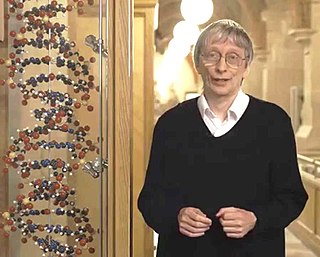
David Elieser Deutsch is a British physicist at the University of Oxford. He is a visiting professor in the Department of Atomic and Laser Physics at the Centre for Quantum Computation (CQC) in the Clarendon Laboratory of the University of Oxford. He pioneered the field of quantum computation by formulating a description for a quantum Turing machine, as well as specifying an algorithm designed to run on a quantum computer. He has also proposed the use of entangled states and Bell's theorem for quantum key distribution and is a proponent of the many-worlds interpretation of quantum mechanics.

Sir Karl Raimund Popper was an Austrian–British philosopher, academic and social commentator. One of the 20th century's most influential philosophers of science, Popper is known for his rejection of the classical inductivist views on the scientific method in favour of empirical falsification. According to Popper, a theory in the empirical sciences can never be proven, but it can be falsified, meaning that it can be scrutinised with decisive experiments. Popper was opposed to the classical justificationist account of knowledge, which he replaced with critical rationalism, namely "the first non-justificational philosophy of criticism in the history of philosophy".
Solipsism is the philosophical idea that only one's mind is sure to exist. As an epistemological position, solipsism holds that knowledge of anything outside one's own mind is unsure; the external world and other minds cannot be known and might not exist outside the mind.

Unschooling is an informal learning method that prioritizes learner-chosen activities as a primary means for learning. Unschoolers learn through their natural life experiences including play, household responsibilities, personal interests and curiosity, internships and work experience, travel, books, elective classes, family, mentors, and social interaction. Often considered a lesson- and curriculum-free implementation of homeschooling, unschooling encourages exploration of activities initiated by the children themselves, under the belief that the more personal learning is, the more meaningful, well-understood, and therefore useful it is to the child. While unschooled students may occasionally take courses, unschooling questions the usefulness of standard curricula, fixed times at which learning should take place, conventional grading methods and standardized tests, forced contact with children in their own age group, the compulsion to do homework regardless of whether it helps the learner in their individual situation, the effectiveness of listening to and obeying the orders of one authority figure for several hours each day, and other features of traditional schooling.
In philosophy of science and in epistemology, instrumentalism is a methodological view that ideas are useful instruments, and that the worth of an idea is based on how effective it is in explaining and predicting natural phenomena. According to instrumentalists, a successful scientific theory reveals nothing known either true or false about nature's unobservable objects, properties or processes. Scientific theory is merely a tool whereby humans predict observations in a particular domain of nature by formulating laws, which state or summarize regularities, while theories themselves do not reveal supposedly hidden aspects of nature that somehow explain these laws. Instrumentalism is a perspective originally introduced by Pierre Duhem in 1906.
Critical rationalism is an epistemological philosophy advanced by Karl Popper on the basis that, if a statement cannot be logically deduced, it might nevertheless be possible to logically falsify it. Following Hume, Popper rejected any inductive logic that is ampliative, i.e., any logic that can provide more knowledge than deductive logic. In other words if we cannot assert it logically, we should at the least try to logically falsify it, which led Popper to his falsifiability criterion.
In philosophy of science and epistemology, the demarcation problem is the question of how to distinguish between science and non-science. It also examines the boundaries between science, pseudoscience and other products of human activity, like art and literature and beliefs. The debate continues after more than two millennia of dialogue among philosophers of science and scientists in various fields. The debate has consequences for what can be termed "scientific" in topics such as education and public policy.
Popper's three worlds is a way of looking at reality, described by the British philosopher Karl Popper in a lecture given in August 1967. The concept involves three interacting worlds, called world 1, world 2 and world 3.
Evolutionary epistemology refers to three distinct topics: (1) the biological evolution of cognitive mechanisms in animals and humans, (2) a theory that knowledge itself evolves by natural selection, and (3) the study of the historical discovery of new abstract entities such as abstract number or abstract value that necessarily precede the individual acquisition and usage of such abstractions. As a branch of inquiry in epistemology, evolutionary epistemology lies at the crossroads of philosophy and evolutionary biology.

Originally, fallibilism is the philosophical principle that propositions can be accepted even though they cannot be conclusively proven or justified, or that neither knowledge nor belief is certain. The term was coined in the late nineteenth century by the American philosopher Charles Sanders Peirce, as a response to foundationalism. Theorists, following Austrian-British philosopher Karl Popper, may also refer to fallibilism as the notion that knowledge might turn out to be false. Furthermore, fallibilism is said to imply corrigibilism, the principle that propositions are open to revision. Fallibilism is often juxtaposed with infallibilism.

In epistemology, the Münchhausen trilemma is a thought experiment intended to demonstrate the theoretical impossibility of proving any truth, even in the fields of logic and mathematics, without appealing to accepted assumptions. If it is asked how any given proposition is known to be true, proof in support of that proposition may be provided. Yet that same question can be asked of that supporting proof, and any subsequent supporting proof. The Münchhausen trilemma is that there are only three ways of completing a proof:
Conventionalism is the philosophical attitude that fundamental principles of a certain kind are grounded on agreements in society, rather than on external reality. Unspoken rules play a key role in the philosophy's structure. Although this attitude is commonly held with respect to the rules of grammar, its application to the propositions of ethics, law, science, biology, mathematics, and logic is more controversial.

The Fabric of Reality is a 1997 book by physicist David Deutsch. His follow-up book, The Beginning of Infinity, was published in 2011.

Hans-Joachim Niemann, is a German philosopher and PhD chemist, who has become known especially as a translator and editor of works by Karl Popper, including first editions and first translations. As a scholarly writer, he first published scientific papers, then many essays and several books on Karl Popper's philosophy and Critical Rationalism, including a 400-page Lexicon of Critical Rationalism. His Popper studies helped to establish Karl Popper as a major ethicist and as an important biophilosopher.
Explanatory power is the ability of a hypothesis or theory to explain the subject matter effectively to which it pertains. Its opposite is explanatory impotence.
John L. Pollock (1940–2009) was an American philosopher known for influential work in epistemology, philosophical logic, cognitive science, and artificial intelligence.

The Beginning of Infinity: Explanations that Transform the World is a popular science book by the physicist David Deutsch first published in 2011.
Bold hypothesis or bold conjecture is a concept in the philosophy of science of Karl Popper, first explained in his debut The Logic of Scientific Discovery (1935) and subsequently elaborated in writings such as Conjectures and Refutations: The Growth of Scientific Knowledge (1963). The concept is nowadays widely used in the philosophy of science and in the philosophy of knowledge. It is also used in the social and behavioural sciences.
Philosophy of conspiracy theories is the academic study by philosophers of the phenomenon and history of conspiracy theories. A conspiracy theory has been defined as an explanation for an event or situation that invokes a conspiracy by sinister and powerful groups, often political in motivation, or more narrowly a conspiracy where other explanations are more probable. The term has a negative connotation, implying that the appeal to a conspiracy is based on prejudice or insufficient evidence.







